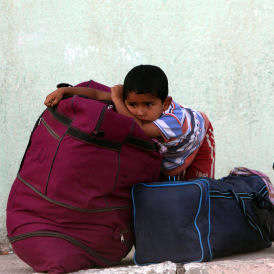Egypt opens Gaza border crossing
Egypt relaxes restrictions at its border with the Gaza Strip, allowing free crossings for the first time in four years. It’s a sign to Israel that the game is changing, an expert tells Channel 4 News.
Egypt and Israel closed their borders with Gaza when Hamas took control in 2007. Humanitarian organisations and foreign governments have criticised the blockade, with Prime Minister David Cameron describing it as a “prison camp” last year.
Now, the new military regime in Egypt, which took control of the country after the fall of President Hosni Mubarak, has reversed his unpopular policy and opened the Rafah border – Gaza’s only window to the outside world.
Already, hundreds of Palestinians have made the crossing, many carrying large suitcases.
Restrictions remain
While the restrictions have eased, men aged between 18 and 40 years will still need a permit to cross, and trade is prohibited. Women, children and men over 40 are allowed to pass freely.
It’s a clear message to Israel that the game is changing. Expert Yossi Mekelberg
Previously, only around 300 people were allowed to cross on a daily basis and its opening hours were more restrictive.
Hamas described the change as “historic and positive”, but Israel criticised the decision, saying it raises security concerns. Last year, Israel eased restrictions on goods entering Gaza but there are still severe shortages and humanitarian concerns in the territory.
One of the first people to cross was Ward Labaa, a 27-year-old woman leaving Gaza for the first time to seek medical treatment in Cairo, the Associated Press reported.
Many believe the relaxation of the crossing conditions to Egypt is a signal of the changing dynamics in the Middle East after the Arab Spring sparked popular uprisings across the region.

‘Symbolic step’
Yossi Mekelberg, Associate Fellow at international relations think tank Chatham House, told Channel 4 News it was a symbolic step.
He said: “It’s a clear message to Israel that the game is changing. The problem with Israel is that it often translates change as a threat, not an opportunity. We need to help them see this as an opportunity.”
Mr Mekelberg, who is also Programme Director of international relations at Regent’s College, said the change in Egyptian policy was an easy way to deal with one of the demands of Egyptian protesters.
“It shows that what has happened in the Arab world in the last few months will affect Israel and Palestine,” he said.
Mubarak fine for internet shutdown
Separately, a court in Egypt has fined the former president Hosni Mubarak and two former officials £540m for cutting off mobile and internet services during January’s protests.
The court said they were guilty of “causing damages to the national economy” and the fines would be paid to the country’s treasury. Mubarak, who is detained in a hospital in Sharm el-Sheikh, still faces other more serious charges, including ordering the killing of protestors, a charge which could carry the death penalty.
 Click on the image above to read more on the Middle East uprisings.
Click on the image above to read more on the Middle East uprisings.